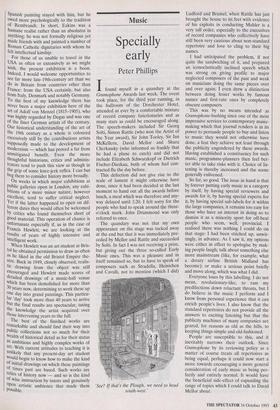Music
Specially early
Peter Phillips
Ifound myself in a quandary at the Gramophone Awards last week. The event took place, for the third year running, in the ballroom of the Dorchester Hotel, attended as ever by a comfortable mixture of record company functionaries and as many stars as could be encouraged along. The speech-makers included Sir Georg Solti, Simon Rattle (who won the Artist of the Year award), Sir John Tooley, Sir Ian McKellern, David Mellor and Shura Cherkassky (who informed us frankly that he had a plane to catch) and did not include Elizabeth Schwarzkopf or Dietrich Fischer-Dieskau, both of whom had con- tracted flu the day before.
This defection did not give rise to the scale of lament it might otherwise have done, since it had been decided at the last moment to hand out all the awards before lunch, a meal which was therefore and any- way delayed until 3.20. I felt sorry for the people who had to speak around the three- o'clock mark. John Drummond was only referred to once.
The quandary was not that my own appearance on the stage was tucked away at the end but that it was immediately pre- ceded by Mellor and Rattle and succeeded by Solti. In fact I was not receiving a prize, but giving out the three so-called Early Music ones. This was a pleasure and in itself remained so, but to have to speak of composers such as Stradella, Heinichen and Cavalli, not to mention (which I did) 'See? If that's the Plough, we need to head south-west.' Ludford and Brumel, when Rattle has just brought the house to its feet with evidence of his exploits in conducting Mahler is a very tall order, especially to the executives of record companies who collectively have still been very cautious about non-standard repertoire and love to cling to their big names.
I had anticipated the problem, if not quite the sandwiching of it, and prepared an iconoclastically inclined speech which was strong on giving profile to major neglected composers of the past and weak on musicians doing the same pieces over and over again. I even drew a distinction between doing lesser works by famous names and first-rate ones by completely obscure composers.
This was by no means intended as Gramophone-bashing since one of the most impressive services to contemporary music- making which that journal renders is in its power to persuade people to buy and listen to music they would not otherwise have done, a feat they achieve not least through the publicity engendered by these awards. Having established a constituency for such music, programme-planners then feel bet- ter able to take risks with it. Choice of lis- tening is thereby increased and the scene generally enlivened.
So far, so good. The issue in hand is that by forever putting early music in a category by itself, by having special reviewers and awards for it, by having special experts for it, by having special sub-labels for it within the large companies, it remains too easy for those who have an interest in doing so to dismiss it as a minority sport for off-beat people who seem, well, provincial. I realised there was nothing I could do on that stage: I had been stitched up, unwit- tingly, in advance. As I saw it, my options were either in effect to apologise by mak- ing people laugh; talk about something else more mainstream (like, for example, what a dreary airline British Midland has become); or make a serious point briefly and move along, which was what I did.
Everyone loses by this labelling. I do not mean, revolutionary-like, to ram my predilections down reluctant throats, but I do believe in the music I perform and I know from personal experience that it can enrich people's lives. I also know that the standard repertoires do not provide all the answers to exciting listening but that the publicity machines of many companies are geared, for reasons as old as the hills, to keeping things simple and old-fashioned.
People are susceptible to this, and it inevitably narrows their outlook. Since Gramophone by its reviewing policy as a matter of course treats all repertoires as being equal, perhaps it could now start a move towards encouraging a more general consideration of early music as being per- fectly and entirely normal. It would have the beneficial side-effect of expanding the range of topics which I could talk to David Mellor about.


























































 Previous page
Previous page